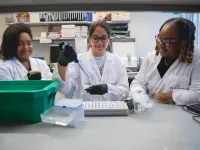(Press-News.org)
ROCHESTER, Minn. — Mayo Clinic researchers are using artificial intelligence (AI) with an advanced 3D body-volume scanner – originally developed for the clothing industry – to help doctors predict metabolic syndrome risk and severity. The combination of tools offers doctors a more precise alternative to other measures of disease risk like body mass index (BMI) and waist-to-hip ratio, according to findings published in the European Heart Journal - Digital Health.
Metabolic syndrome can lead to heart attack, stroke and other serious health issues and affects over a third of the U.S. population and a quarter of people globally. The condition lacks widely accepted screening strategies. However, researchers found that using a 3D body volume scanner combined with imaging technology and Mayo Clinic-developed algorithms may help clinicians offer a more accurate method for identifying people who have the syndrome, as well as those at risk for developing it.
The effects of metabolic disease create hardship for patients. In addition to heart attack and stroke, people with metabolic syndrome are more likely to develop diabetes, cognitive disease and liver disease. Metabolic syndrome is diagnosed clinically when at least three of these five conditions are present: abdominal obesity, high blood pressure, high triglycerides, low HDL cholesterol and high fasting blood sugar.
"There is a need for a reliable, repeatable measure of metabolic syndrome risk and severity," says Betsy Medina Inojosa, M.D., a research fellow at Mayo Clinic and first author of the study. "Body mass index measurements and bioimpedance scales that measure body fat and muscle are inaccurate for many people, and other types of scans are not widely available. Our research shows that this AI model may also be a tool to guide clinicians and patients to take action and seek outcomes that are a better fit for their metabolic health."
To develop the tool, researchers trained and validated an AI model on 1,280 volunteer subjects who underwent an evaluation that included 3D body-volume scans, standardized clinical questionnaires, blood tests and traditional body shape measurements. An extra 133 volunteers had front- and side-view images taken via a mobile app from Select Research called myBVI to further test the tool's ability to evaluate whether they had metabolic syndrome, and if so, how severe it was.
People with metabolic syndrome typically have apple-shaped bodies, meaning they carry a lot of their weight around the abdomen. The diagnosis of metabolic syndrome revolves around laboratory tests, blood pressure and body shape measurements, but there are no widely accepted routine screening strategies because these measurements are not always available or reproducible in the same way.
"This small study finds that digitally measuring a patient's body volume index with 3D imaging provides a highly accurate measurement of shapes and volumes in critical regions where unhealthy visceral fat is deposited, such as the abdomen and chest," says Francisco Lopez-Jimenez, M.D., director of Preventive Cardiology at Mayo Clinic in Rochester and senior author of the study. "The scans also record the volume of hips, buttocks and legs – a measure related to muscle mass and 'healthy' fat. The 3D information about body volume in these key regions, whether from the large, stationary 3D scanner or from the mobile app, accurately flagged the presence and severity of metabolic syndrome using imaging instead of invasive tests. Looking ahead, the next steps will be to broaden the sample of research subjects to include more diversity."
Mayo Clinic and the researchers have a financial interest in the technology referenced in this press release. Mayo Clinic will use any revenue it receives to support its not-for-profit mission in patient care, education and research.
###
About Mayo Clinic
Mayo Clinic is a nonprofit organization committed to innovation in clinical practice, education and research, and providing compassion, expertise and answers to everyone who needs healing. Visit the Mayo Clinic News Network for additional Mayo Clinic news.
END
3D body volume scanner uses AI to help predict metabolic syndrome risk
2024-08-22
ELSE PRESS RELEASES FROM THIS DATE:
Building a COMPASS to navigate future pandemics
2024-08-22
Viruses like SARS-CoV-2 don’t respect boundaries, moving between species and continents and leaving destruction as they go. Beating the next pathogen with pandemic potential means getting good at crossing borders ourselves — between fields of study, between research universities, and between scientists and the wider community.
An $18 million grant announced by the U.S. National Science Foundation (NSF) will put that goal within reach. The award brings together five universities and more than 20 researchers, academics, and public health experts to establish the Virginia Tech-led Center ...
Macrophage mix helps determine rate and fate of fatty liver disease
2024-08-22
Formerly known as nonalcoholic steatohepatitis, metabolic dysfunction-associated steatohepatitis (MASH) is an inflammatory disease characterized by liver scarring or fibrosis that progressively impairs liver function.
It is a major risk factor for cirrhosis and liver cancer. And because treatment options are limited, MASH is the second leading cause for liver transplants in the United States after cirrhosis caused by chronic hepatitis C infection.
A better understanding of the pathological processes that drive MASH is critical to creating effective treatments. In a new paper published ...
Department of Energy announces $36 million to support energy-relevant research in underrepresented regions of America
2024-08-22
WASHINGTON, D.C. - Ensuring that scientific funding goes to states and territories that have typically received smaller fractions of federal research dollars in the past, the Department of Energy (DOE) today announced $36 million in funding for 39 research projects in 19 states via the Established Program to Stimulate Competitive Research (EPSCoR). The grants connect innovative ideas from scientists at eligible institutions with leading-edge capabilities at the DOE national laboratories.
Supporting scientists while building the expertise and capabilities critical for performing leading research ...
Analysis of 1,500 climate policies reveals only a small fraction achieved significant emission reductions
2024-08-22
A new machine learning analysis has revealed the most effective climate policies out of 1,500 implemented worldwide over the last two decades. Some of the success stories – numbered at about 63 – involve rarely studied policies and unappreciated policy combinations. “Our results provide a clear yet sobering perspective on the policy effort necessary for closing the remaining emissions gap of 23 billion tons carbon dioxide (CO2) by 2023,” write the authors. To achieve the Paris Agreement’s climate targets, it is essential to know which ...
Fatty-acid derived polymers yield recyclable and highly versatile adhesives
2024-08-22
Researchers have presented a new family of polymer adhesives that offer a sustainable and recyclable alternative to conventional polymer adhesives and can be used across a wide range of applications, from industrial adhesives to surgical superglues. The new chemical approach to aLA polymerization addresses the performance and environmental challenges of traditional polymers, providing environmentally friendly adhesive solutions. Polymer adhesives are ubiquitous in modern life and are widely used in many medical, consumer, and industrial products. Given this diversity, each adhesive material is often tailored ...
Governance needed to ensure biosecurity of biological AI models
2024-08-22
Concerns over the biosecurity risks posed by artificial intelligence (AI) models in biology continue to grow. Amid this concern, Doni Bloomfield and colleagues argue, in a Policy Forum, for improved governance and pre-release safety evaluations of new models in order to mitigate potential threats. “We propose that national governments, including the United States, pass legislation and set mandatory rules that will prevent advanced biological models from substantially contributing to large-scale dangers, such as the creation of novel or enhanced pathogens ...
Spontaneous transfer of mitochondrial DNA into the nuclear genomes in the human brain over the individual’s lifespan
2024-08-22
Somatic nuclear mitochondrial DNA (Numt) insertions are mito-nuclear gene transfer events that can arise in the germline and in cancer. This study shows that Numt insertions arise spontaneously and accumulate in brain tissues during development or over the human lifespan.
#####
In your coverage, please use this URL to provide access to the freely available paper in PLOS Biology: http://journals.plos.org/plosbiology/article?id=10.1371/journal.pbio.3002723
Article Title: Somatic nuclear mitochondrial DNA insertions are prevalent in the human brain and accumulate over time in fibroblasts
Author Countries: United States
Funding: see manuscript END ...
Cancer drug could treat early-stage Alzheimer’s disease, study shows
2024-08-22
UNIVERSITY PARK, Pa. — A type of drug developed for treating cancer holds promise as a new treatment for neurodegenerative diseases such as Alzheimer’s, according to a recent study by researchers at Penn State, Stanford University and an international team of collaborators.
The researchers discovered that by blocking a specific enzyme called indoleamine-2,3-dioxygenase 1, or IDO1 for short, they could rescue memory and brain function in models that mimic Alzheimer’s disease. The findings, published today (Aug. 22) in the journal Science, suggest that IDO1 inhibitors currently ...
Drugs that improve brain metabolism could help Alzheimer’s patients
2024-08-22
Among the many ways neuroscientists think Alzheimer’s disease may strip away brain function is by disrupting the glucose metabolism needed to fuel the healthy brain. In essence, declining metabolism robs the brain of energy, impairing thinking and memory.
Against that backdrop, a team of neuroscientists at the Knight Initiative for Brain Resilience at Stanford’s Wu Tsai Neurosciences Institute have zeroed in on a critical regulator of brain metabolism known as the kynurenine pathway. They hypothesize that that the kynurenine pathway is overactivated as a result of ...
Life after (feigned) death
2024-08-22
A new study led by scientists from the University of Bristol has revealed what animals do after they have feigned death in order to avoid being killed by a predator and what the context of this behaviour is.
Many animals, as a last-ditch defence, become motionless after being contacted by a predator.
This behaviour is so common that it's recognised in such phrases as “playing possum”. It is even said to occur in humans in extreme circumstances.
In previous studies, carried out by the same team using antlion larvae, scientists noticed that they become motionless after being individually handled.
At one point ...




